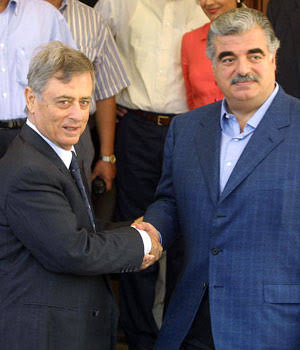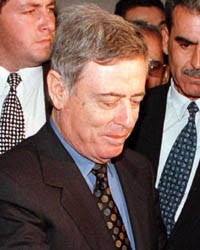Abdul Halim Khaddam’s relationship with Rafik Hariri began when Abu Bahaa (Rafik Hariri) visited Damascus, acting as an intermediary between the factions of the civil conflict in Lebanon, which has been under Assad’s forces for years. At that time, the media presented Hariri as a Saudi businessman of Lebanese origin. Khaddam was impressed by Hariri’s personality and, given his Arab identity and connections, a personal harmony developed between them.
Hariri’s rounds between Beirut and Damascus extended to the Geneva and Lausanne conferences, where failure occurred, but the path was widening for strong relations between the two men. Hariri was convinced by Khaddam’s advice to make Damascus an additional residence. He bought a small palace near the Saudi embassy in the Syrian capital, which he frequented. When relations between Iran and Saudi Arabia soured due to Riyadh’s support for Baghdad during the Iraq-Iran war (1980-1988), the man’s friends in Riyadh, as well as Khaddam, asked him to stop visiting Beirut, especially after his friend, Oghie Lebanon’s Director, Fadel Shalak, was kidnapped in a message to him. Damascus became a central hub for him, receiving Lebanese visitors who began to increase—politicians, journalists, individuals with economic interests, and humanitarian associations. His communication with Abu Jamal (Khaddam) escalated as friendly and warm, especially after Khaddam became a treasure trove of information about Lebanon and Syria, not hesitating to share information with his friend about everything he wanted to know.
The political intricacies eroded Hariri’s mind and heart, and Khaddam succeeded in reviving the plant that Hariri had planted in his earlier affiliation with the Arab nationalists’ movement when it was Nasserist. This revival opened the doors of Lebanese politics to Hariri, with its alleys, people, secrets, and who better than Abu Jamal to guide him through them.
Moreover, Khaddam’s most crucial role was in bridging the gap between Hariri and the ruler of Lebanon and Syria, Hafez al-Assad. Meetings between Hariri and Assad multiplied, and Abu Bahaa’s mind was open to receiving political lessons from different quarters, including King Fahd in Saudi Arabia, Hafez al-Assad in Syria, Jacques Chirac in France, in addition to Khaddam in Damascus.
Khaddam succeeded in strengthening Hariri’s relationship with the elder Assad, but he also succeeded in thwarting any potential relationship between Hariri and Assad’s son, Bashar.
Hafez became convinced in 1992 that Hariri was the right man to save Lebanon from its crisis, especially after the dollar reached 3,000 Lebanese pounds during the government of Omar Karami. Hafez wanted him to be the Prime Minister, but he had to wait for the parliamentary elections held in the summer of the same year amid near-complete Christian and Sunni boycotts.
Alawite fundamentalists protested against assigning Hariri to form a Lebanese government. One of them, possibly General Mohammed Nassif, stated that Hariri is Saudi Arabia’s man, a friend of France and America, a friend of Egypt and Turkey. Damascus does not accept that its friends have relationships with others unless it aligns with its directives.
Assad’s response at the time was:
“All of Lebanon is now under our control after we quelled Michel Aoun’s rebellion following our obtaining American-Arab authorization to end its civil war. However, Lebanon is in a major crisis, and we won’t be able to extricate it from it. We are responsible for it. Therefore, Hariri, with his vast capabilities and extensive relationships, can rescue Lebanon in this stage.”
Khaddam was the main supporter of Hariri’s project in Lebanon, even when Abu Bahaa faced groups receiving instructions from Mohammed Nassif in Damascus. Hariri’s project was obstructed several times, leading him to contemplate withdrawal. In these moments, Khaddam would call the elder Assad, seeking permission to go to Beirut on his behalf, pacify Hariri, and halt the campaigns of Nassif’s group against him. This protection was temporary, as these organized campaigns against any project initiated by Hariri were frequent, and Khaddam repeatedly intervened to shield him.
The defamation campaign against Hariri reached a point of slander because he proposed a project to expand Beirut International Airport to accommodate six million passengers annually. Detractors claimed that this project was designed to align with Shimon Peres’s Zionist project.
In Syria, there was considerable animosity towards Hariri, the Sunni Arab global figure, fueled by Mohammad Nassif in the hearts of Assad’s sons, whom Abu Wael oversaw raising—Bassel, Bashar, and Maher. Bassel, before his death in January 1994, led and directed a group of Lebanese politicians, media figures, party members, and security personnel against Hariri. When Hafez designated Bashar as his heir, this son inherited his brother’s animosity towards Hariri, as instilled by Nassif. In return, Khaddam did not wish to facilitate matters for Hariri with Bashar.
Khaddam embraced Hariri and distanced him from Bashar.
Nassif embraced all of Hariri’s opponents in Lebanon. Following the security culture laid out by Hafez al-Assad, upon which his regime was built until now, he took pleasure in conflicts between his factions, promoting them to gain deeper loyalty. Each leader of the security apparatus rushed to write reports containing the information Hafez desired, allowing him to control everyone. He would then amuse himself by reading these reports while confined within his presidential palaces.
Hafez requests a meeting between Hariri and Bashar.
Assad requested that Hariri meet his son, Bashar. Abu Bahaa would convey the president’s request to Abu Jamal and Abu Hazem (Hikmat al-Shihabi). The constant advice from both of them to Hariri was: “Avoid meeting this illegitimate son.”
Based on this response from both, Hariri would ignore the meeting with Bashar until…?
Abu Jamal told us during our meeting in Paris in 2006 that Hariri once came to his house in Damascus with a troubled expression. Abu Jamal asked him about the reason for his distress, and Hariri replied:
Hariri: “He pressured me.”
Khaddam: “Who pressured you?”
Hariri: “Bashar.”
Khaddam: “Why did you go to him?”
Hariri: “Many advised me to meet him, so I requested an appointment. He set it at his private apartment on Mount Qasioun. I met him there and was surprised to find Suleiman Frangieh (the grandson) with him. He treated me with a lack of manners and mockery. If his mocking remarks were only between him and me, it would have been half a disaster, but he deliberately humiliated me in the presence of Suleiman.”
Lahoud:
Khaddam was the first supporter of Rafik Hariri in his efforts to prevent Army Commander Emile Lahoud from reaching the presidency. The estrangement between Lahoud and Hariri was an expression of the state between Bashar, who supported Lahoud, and Hariri himself. The chemistry between Lahoud and Hariri was missing, and each vowed to eliminate the other. Hariri was quoted as saying that he would reduce Lahoud to a low-ranking officer in the army, while Lahoud vowed to send Hariri to prison.
Khaddam supported Hariri in endorsing the extension for Elias El-Hrawi and persuaded Assad to keep El-Hrawi for an additional three years to delay Lahoud’s ascent, which was Bashar’s path to the presidency.
El-Hrawi’s rule ended in 1998, and Lahoud’s rule began. Lahoud initiated a vendetta against Prime Minister Hariri’s state, forming a front with Bashar to end Rafik Hariri. It began with Hariri’s mistake in dealing with the new era, as Hariri distanced himself from Lahoud from 1998 to 2000. Hariri returned on a white horse in the elections that year, increasing the hatred of Lahoud and Bashar toward him.
Hariri remained under the protection of Khaddam and those responsible for Lebanon’s file (Shihabi, Doba, Kanaan) as long as Hafez al-Assad was alive. When Hafez died, and Bashar assumed power, he quickly seized the gift from his late father, Lebanon, the prey of the regime and its apparatus that Hafez al-Assad had built in Syria.
Khaddam himself knew that Bashar did not like him, and Bashar’s inner circle spoke about Abu Jamal and his relationship with Hariri.
Khaddam’s file in Bashar’s eyes is based on three pillars: that he is corrupt, that he is a friend of Hariri, and that he is Sunni.
Bashar, the corrupt, who knows that his father’s regime was built on corruption, cannot fight Khaddam with this accusation.
Bashar knows that his father relied on some Sunnis to protect his regime from the accusation of Alawite domination. Alongside him were Hikmat al-Shihabi from Aleppo, Mustafa Tlass from Homs, Abdul Halim Khaddam from Banias, Farouk al-Sharaa from Daraa, and Abdel Raouf Kasm from Damascus. Therefore, Sunni Abdul Halim Khaddam is not a personal flaw (but an objective danger to a regime based on Alawite sectarianism, with Alawites being the minority governing the Sunni majority since 1966).
Khaddam’s relationship with Hariri remains the most significant charge in Bashar’s eyes, and this is what he will be held accountable for.
Khaddam conveyed to Hariri his concerns about Bashar’s hostility towards him. Both Khaddam and Hariri stopped direct communication, as it was in the past. Messages were sometimes relayed through intermediaries, including Hariri’s son-in-law Mohsen Dalloul, associated with the leaders handling the Lebanon file (specifically Shihabi).
Kanaan
Khaddam told us that Bashar deliberately mocks Hariri in his presence and acts contrary to Khaddam’s requests. He recounted an incident when he was at Damascus airport bidding farewell to Bashar, who was heading to India to attend a conference of non-aligned nations. Khaddam asked Bashar to pay attention to Ghazi Kanaan, who had proven to be highly successful in controlling Lebanon. Bashar promised to consider it favorably. However, upon Bashar’s return from India, he promptly removed Kanaan from Lebanon, transferring his responsibilities to Rustum Ghazale.
Khaddam used to advise Bashar to focus on Walid Jumblatt, the Druze leader. However, Bashar would target the Druze leader, cozying up to his smaller adversaries.
The Assassination
Khaddam heard Bashar using offensive language against Hariri, accusing him of attempting to obstruct Lahoud’s rule in Lebanon, being against his extension (2004-2007), and attributing the decision of Resolution 1559, calling for the withdrawal of Syrian forces from Lebanon, to him.
Khaddam asked Mohsen Dalloul to convey to Hariri that Bashar wanted to get rid of him, and he should leave Lebanon. However, Hariri did not respond.
Khaddam came to Lebanon under the pretext of undergoing medical tests at the American University Hospital. From there, he went to Hariri’s residence in Qoreitem to warn him. He said Bashar insulted you during a meeting of the Qatari leadership. I was present at the meeting, and he claimed you were an American-Zionist agent, which essentially means you are a traitor, and he will kill you.
He advised Hariri to go to France or Saudi Arabia, conduct political and personal tours, and not stay in Lebanon. Hariri responded by saying that he had heard such warnings from Jacques Chirac, Hosni Mubarak, and the brothers in Saudi Arabia. However, he couldn’t leave the country now as he had commitments to his political groups. Hariri stated that if he left, these groups would collapse, and he also had upcoming elections in June, so he would complete the elections and then leave.
On February 14, 2005, Rafik Hariri was assassinated. Khaddam visited Beirut to offer condolences. Afterward, he left Damascus for Paris, citing the need for medical treatment. On New Year’s Eve (2005-2006), Khaddam announced via Al Arabiya that Bashar was responsible for Rafik Hariri’s assassination.


